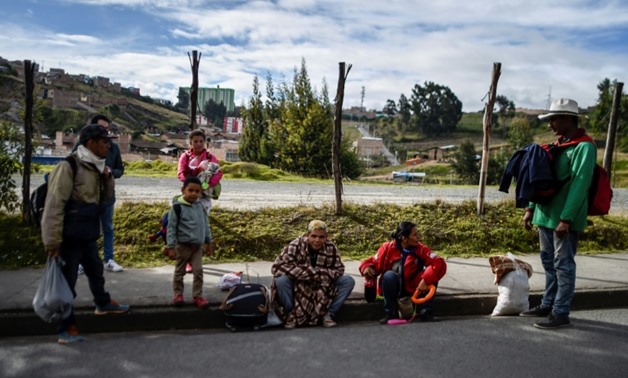
Venezuelan migrant Mariangela Ascano (2-L, behind) pauses with relatives and friends on the Pan-American Highway in Ipiales, Colombia, on the way to Ecuador,
ECUADOR - 25 August 2018: Ecuador opened a "humanitarian corridor" to allow masses of migrants escaping Venezuela's free-falling economy to stream towards the Peruvian border Friday, hours before Lima puts new restrictions on entry into effect.
Ecuadoran Interior Minister Mauro Toscanini said there were currently 35 busloads of migrants on the move along the route authorities had opened to Peru.
"We are going to continue as long as we can," said the minister, whose country is being crossed by tens of thousands of Venezuelans seeking to join relatives and take up work opportunities in Peru, Chile and beyond.
Peru is one of the region's fastest growing economies, projecting 4.7 percent growth next year.
Venezuelans trying to cross the Peruvian border after a midnight deadline will be required to produce a passport; until then, an identity card will suffice.
Peru's new passport rules threaten to leave tens of thousands of Venezuelans stranded in Ecuador and Colombia, who are already inundated with migrants from the crisis-wracked country.
Ecuador -- where close to half a million people have fled this year alone -- imposed a passport requirement only last week to try to limit the numbers of Venezuelans trying to enter from Colombia.
UN Secretary-General Antonio Guterres will set up a special UN team to ensure a coordinated regional response to the crisis, his spokesman Stephane Dujarric said Friday.
- On the Road -
Venezuelans are rushing out of the country to join those who have already fled a deepening economic crisis, as regional governments struggle to cope with one of the biggest exoduses in Latin American history.
The UN says more than 2.3 million of Venezuela's 30.6 million population have fled the country since the current crisis began in 2014 -- a staggering 7.5 percent.
The pace of departures has accelerated in recent days, sparking a warning from the United Nations.
"It remains critical that any new measures continue to allow those in need of international protection to access safety and seek asylum," UN High Commissioner for Refugees Filippo Grandi said Thursday in a statement.
The UN said up to 4,000 people were arriving daily in Ecuador, Peru, Colombia and Brazil, where migrants have been violently turned back by locals concerned by increasing crime.
Ecuador will host a 13-nation regional summit next month to discuss the crisis.
Argentina, Brazil, Colombia, Costa Rica, Chile, Mexico, Peru, Paraguay, Panama, the Dominican Republic, Uruguay and Venezuela have been invited to the September 17-18 meeting in Quito, officials said.
- Lines at Peruvian border -
In Tumbes, on the Peruvian side of the border with Ecuador, lines of people waited to have their papers checked, sweating in the tropical heat.
Only around half of the Venezuelans fleeing their homes and the economic chaos there are carrying passports, according to Colombia's migration director, Christian Kruger. The other half have identity cards.
Like Colombia, Peru has been struggling to cope. Earlier this month, a record 5,100 people entered the country in a single day.
- Weary and hungry -
Peru's migration superintendent, Eduardo Sevilla, said on Thursday that "there are already 400,000" Venezuelans in the country and if they continue arriving at the same rate, there will be "half a million by the beginning of November."
Many queueing at the border in Peru left Venezuela on foot weeks ago. They've already traveled 2,000 kilometers (1,240 miles), but those who get through face another 1,200-kilometer journey to the Peruvian capital Lima.
Local churches have been handing out food to the weary and hungry migrants as they wait.
Meanwhile, Peru has called for calm, saying the number of Venezuelans affected by the new policy will be relatively minor.
"No one's talking about the closing of borders," said Interior Minister Mauro Medina.
He said Peru is improving its "migration control for reasons of order and security," adding that "80 percent of Venezuelans who come into the country do so with a passport."
In Colombia, Kruger criticized the measures announced by Bogota's two southern neighbors, admitting he was "worried about the consequences."
"Asking for a passport isn't going to stop migration, because they're leaving their country not out of choice but out of necessity," he said.
- 'Multilateral action' -
Venezuela is in a fourth straight year of recession, with double-digit declines in its gross domestic product. The inflation rate is expected to reach a mind-boggling one million percent this year, according to the International Monetary Fund.
Under President Nicolas Maduro's leadership, Venezuelans are suffering from severe shortages of food, medicine and other basic necessities, while public services have been failing.
Industry is operating at only 30 percent, hit hard by the crash in oil prices since 2014 in a country that earns 96 percent of its revenue from crude.
In efforts to boost the economy, Maduro and his government have implemented measures including a redenomination of the bolivar, a loosening of foreign capital rules and a massive increase in the minimum wage.
But critics and analysts say those moves will likely be counterproductive.


Comments
Leave a Comment